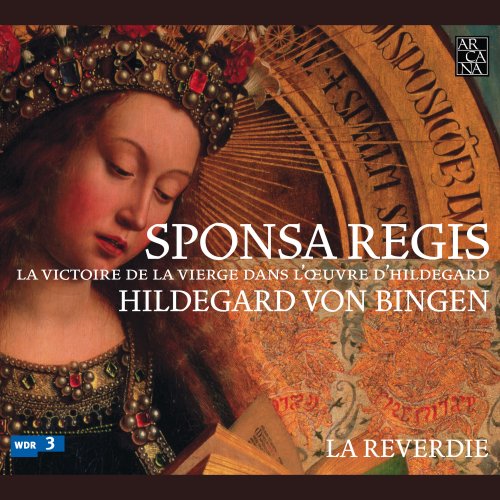
La Reverdie, I Piccoli Cantori di San Bortolo - Von Bingen: Sponsa Regis (La victoire de la Vierge dans l'œuvre d'Hildegard) (2009)
BAND/ARTIST: La Reverdie, I Piccoli Cantori di San Bortolo
- Title: Von Bingen: Sponsa Regis (La victoire de la Vierge dans l'œuvre d'Hildegard)
- Year Of Release: 2009
- Label: Arcana
- Genre: Classical
- Quality: flac lossless (tracks) +Booklet
- Total Time: 01:11:01
- Total Size: 281 mb
- WebSite: Album Preview
Tracklist
01. O dulcissime amator (Symphonia virginum)
02. Hodie aperuit nobis clausa porta (Antiphona)
03. De Sancta Maria: O splendidissima gemma (Antiphona)
04. Affluens deliciis David Regis filia (Sequentia)
05. De Sancta Maria: Ave Maria auctrix vitæ-O dulcissima-Gloria (Responsorium)
06. Nunc gaudeant materna viscera (Antiphona)
07. O frondens virga (Antiphona) / Psalmus XLIV
08. Cum erubuerint infelices (Antiphona)
09. Audi chorum organicum (Sequentia)
10. Lectio I
11. O tu suavissima virga-Nam in mystico mysterio-Gloria (Responsorium)
12. O virga ac diadema purpure Regis (Sequentia)
13. Lectio II
The beautifully packaged recordings of medieval music ensemble La Reverdie seem partly arranged to support the erudite booklet essays of vocalist and group leader Ella de Mircovich, rather than the other way around. The intellectual scaffolding of the notes for this release of chants by Hildegard von Bingen is particularly intricate. But beyond the fact that some of Hildegard's chants are performed with instrumental accompaniment (the abbess having written in general terms about the uses of instruments in worship), it's hard to point to specific details of the performance that are shaped by de Mircovich's philosophical conception of the music, which ranges from neoplatonism to the writings of French philologist Georges Dumézil, a theorist of the roots of Indo-European societies. The chants performed here often touch on the theme of virginity, which, for de Mircovich, carries in Hildegard's music and career overtones of "(1) Royal Sacredness, (2) Warlike Strength, and (3) Fecundity." These reach back in time to Dumézil's (get ready) "Trifunctional Indo-European Theologemes," sort of essential forces of proto-Indo-European society (which nobody is even sure really existed): the sacred, the martial, and the social. The entire hefty essay, written in Italian, appears in English, German, and French translation. It is impossible to summarize in this space, but de Mircovich tries to answer the question of why Hildegard was so widely admired, even by male theorists, and so widely thought of as radical, when actually her music was pretty straightforward for its time. The answer touches on philosophical archetypes of the sort described above. The average listener in search of a basic Hildegard disc is going to get more than s/he bargained for here, but those invited to stretch their minds with the kind of somewhat speculative philosophizing for which medievalists are famous will find plenty to chew. As with other discs in this series, both the engineering and the album iconography are beautifully done.
01. O dulcissime amator (Symphonia virginum)
02. Hodie aperuit nobis clausa porta (Antiphona)
03. De Sancta Maria: O splendidissima gemma (Antiphona)
04. Affluens deliciis David Regis filia (Sequentia)
05. De Sancta Maria: Ave Maria auctrix vitæ-O dulcissima-Gloria (Responsorium)
06. Nunc gaudeant materna viscera (Antiphona)
07. O frondens virga (Antiphona) / Psalmus XLIV
08. Cum erubuerint infelices (Antiphona)
09. Audi chorum organicum (Sequentia)
10. Lectio I
11. O tu suavissima virga-Nam in mystico mysterio-Gloria (Responsorium)
12. O virga ac diadema purpure Regis (Sequentia)
13. Lectio II
The beautifully packaged recordings of medieval music ensemble La Reverdie seem partly arranged to support the erudite booklet essays of vocalist and group leader Ella de Mircovich, rather than the other way around. The intellectual scaffolding of the notes for this release of chants by Hildegard von Bingen is particularly intricate. But beyond the fact that some of Hildegard's chants are performed with instrumental accompaniment (the abbess having written in general terms about the uses of instruments in worship), it's hard to point to specific details of the performance that are shaped by de Mircovich's philosophical conception of the music, which ranges from neoplatonism to the writings of French philologist Georges Dumézil, a theorist of the roots of Indo-European societies. The chants performed here often touch on the theme of virginity, which, for de Mircovich, carries in Hildegard's music and career overtones of "(1) Royal Sacredness, (2) Warlike Strength, and (3) Fecundity." These reach back in time to Dumézil's (get ready) "Trifunctional Indo-European Theologemes," sort of essential forces of proto-Indo-European society (which nobody is even sure really existed): the sacred, the martial, and the social. The entire hefty essay, written in Italian, appears in English, German, and French translation. It is impossible to summarize in this space, but de Mircovich tries to answer the question of why Hildegard was so widely admired, even by male theorists, and so widely thought of as radical, when actually her music was pretty straightforward for its time. The answer touches on philosophical archetypes of the sort described above. The average listener in search of a basic Hildegard disc is going to get more than s/he bargained for here, but those invited to stretch their minds with the kind of somewhat speculative philosophizing for which medievalists are famous will find plenty to chew. As with other discs in this series, both the engineering and the album iconography are beautifully done.
As a ISRA.CLOUD's PREMIUM member you will have the following benefits:
- Unlimited high speed downloads
- Download directly without waiting time
- Unlimited parallel downloads
- Support for download accelerators
- No advertising
- Resume broken downloads


